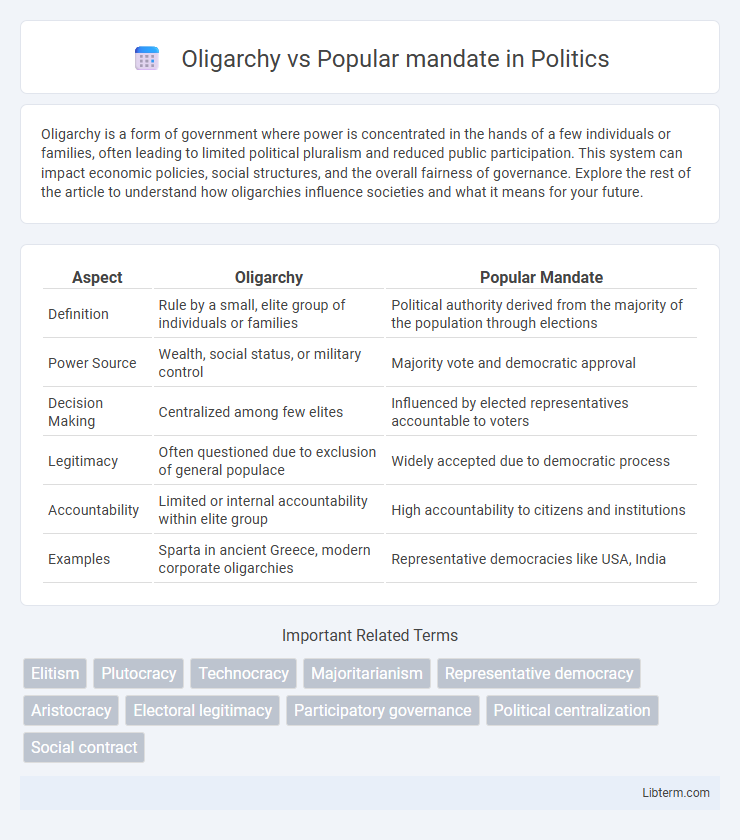Oligarchy is a form of government where power is concentrated in the hands of a few individuals or families, often leading to limited political pluralism and reduced public participation. This system can impact economic policies, social structures, and the overall fairness of governance. Explore the rest of the article to understand how oligarchies influence societies and what it means for your future.
Table of Comparison
| Aspect | Oligarchy | Popular Mandate |
|---|---|---|
| Definition | Rule by a small, elite group of individuals or families | Political authority derived from the majority of the population through elections |
| Power Source | Wealth, social status, or military control | Majority vote and democratic approval |
| Decision Making | Centralized among few elites | Influenced by elected representatives accountable to voters |
| Legitimacy | Often questioned due to exclusion of general populace | Widely accepted due to democratic process |
| Accountability | Limited or internal accountability within elite group | High accountability to citizens and institutions |
| Examples | Sparta in ancient Greece, modern corporate oligarchies | Representative democracies like USA, India |
Understanding Oligarchy: Definition and Key Features
Oligarchy is a political system where power is concentrated in the hands of a small, elite group often distinguished by wealth, family ties, or military control. This governance structure limits broad public participation, contrasting sharply with popular mandate systems that derive authority from the electorate's direct consent. Key features of oligarchy include restricted political competition, centralized decision-making, and the prioritization of the ruling class's interests over the general populace.
The Essence of Popular Mandate
The essence of popular mandate lies in the authority granted by the collective will of the people, ensuring that governance reflects the majority's interests and consent. Unlike oligarchy, where power is concentrated in the hands of a few elites, popular mandate emphasizes democratic participation and accountability. This principle fosters legitimacy and social cohesion by rooting political power in widespread public approval and representation.
Historical Origins of Oligarchy and Popular Mandate
Oligarchy traces its historical origins to ancient Greece, particularly in city-states like Sparta, where power was concentrated in the hands of a few elites based on wealth, military control, or aristocratic lineage. The popular mandate, evolving from the concept of popular sovereignty in Enlightenment thought, gained prominence during the French and American revolutions as a principle that legitimizes political power through the consent of the governed and democratic elections. These divergent origins highlight oligarchy's roots in exclusionary governance versus the popular mandate's foundation in inclusive, representative rule.
Power Dynamics: Who Governs in Each System?
Oligarchies concentrate power in the hands of a few elites or influential families who make decisions based on their interests, limiting broad public participation. In contrast, popular mandate systems derive authority from the electorate, with leaders accountable to the majority through democratic processes such as elections and referendums. This fundamental difference shapes governance, as oligarchies emphasize control by a select group, whereas popular mandate systems prioritize representation and legitimacy from popular consent.
Decision-Making Processes Compared
Oligarchy centralizes decision-making within a small group of elites, often prioritizing efficiency and control but risking limited representation and public accountability. Popular mandate relies on broader citizen participation, enhancing democratic legitimacy and inclusiveness at the cost of slower decision-making and potential gridlock. The contrast highlights a trade-off between concentrated authority with streamlined processes and dispersed power fostering participatory governance.
Representation: Elite Control vs. Mass Participation
Oligarchy concentrates power in the hands of a select elite group, limiting broader societal participation and often prioritizing the interests of a few over the many. Popular mandate ensures representation through mass participation, empowering citizens to influence decision-making and policy direction via elections or referendums. This dynamic highlights the contrast between elite control, characterized by restricted political access, and inclusive governance grounded in widespread voter engagement.
Examples of Oligarchies in Modern Society
Oligarchies in modern society often manifest in states like Russia, where power is concentrated among a small group of wealthy elites who control key political and economic resources. Another example includes corporate oligarchies in countries such as the United States, where influential business leaders exert significant influence over policy decisions through lobbying and campaign financing. These oligarchic systems contrast sharply with popular mandates, which emphasize governance based on widespread public support and democratic electoral processes.
Popular Mandate in Democratic Systems
Popular mandate in democratic systems represents the explicit endorsement by the electorate for elected representatives' authority to govern, reflecting the principle of political legitimacy derived from the people's will. It contrasts sharply with oligarchy, where power is concentrated in a limited group, often undermining broad-based political participation and accountability. Democracies rely on mechanisms like free elections, referendums, and public consultations to secure and validate the popular mandate, ensuring government actions align with the electorate's preferences and sustaining institutional trust.
Social and Economic Impacts of Both Systems
Oligarchy often concentrates wealth and power within a small elite, leading to economic inequality and limited social mobility, whereas a popular mandate promotes broader participation in governance, fostering more equitable resource distribution and social inclusivity. Economically, oligarchies can stifle innovation and growth due to restricted competition, while popular mandates typically encourage policies supporting widespread economic development and social welfare. Socially, oligarchic systems may breed discontent and social unrest, whereas popular mandates strengthen social cohesion through inclusive decision-making and representation.
Oligarchy vs. Popular Mandate: Which Ensures Accountability?
Oligarchy centralizes power in a small elite, often reducing transparency and limiting public oversight, which undermines accountability. A popular mandate, derived from the electorate's collective will, promotes representative governance and mechanisms like elections and public consultations that enhance political accountability. Empirical studies show regimes anchored in popular mandates tend to exhibit higher responsiveness and institutional checks compared to oligarchic systems.
Oligarchy Infographic

 libterm.com
libterm.com